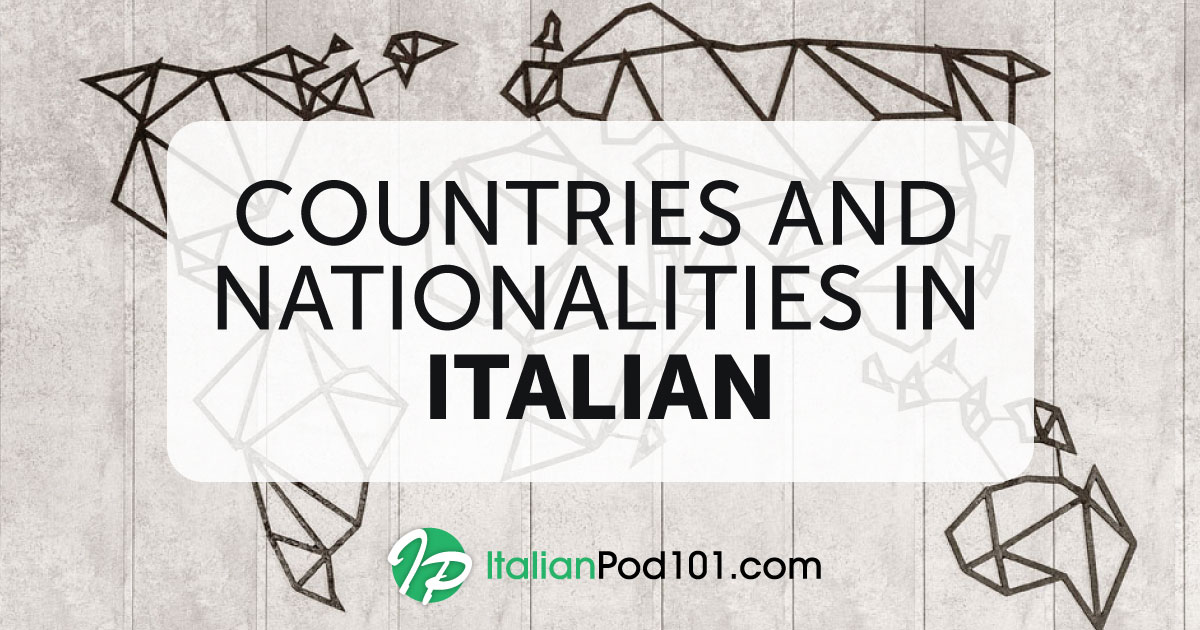
Proverbs are pearls of wisdom, sometimes coined by famous individuals but more often of anonymous origin. Some proverbs go back to the beginning of humanity itself, and although they sound a bit old sometimes, they always have a practical application in everyday life and can help us deal with complicated situations.
In general, proverbs tend to transmit popular wisdom in a very concrete way. They often stand out for their irony, their colorful comparisons, and their funny tones and metaphors.
Italian proverbs are an important part of the language, because…
- …Italians use them often in conversations.
- …they belong to a shared body of knowledge.
- …they typically denote specific cultural traits of the country.
That last point is especially important, because each culture has its own set of proverbs and idioms. They reflect a particular sense of wisdom, in harmony with the history of each country. Many of these are universal, but there are equally well-known local variations.
In this guide from ItalianPod101.com, you’ll learn about some of the most common Italian proverbs, what they mean, and how to use them.

Proverbs = traditional popular culture.
 Table of Contents
Table of Contents
- Proverbs About Time
- Proverbs About Food
- Proverbs with Animals
- Proverbs About Love and Family
- Proverbs About Life, Wisdom, and All the Rest…
- Conclusion
1. Proverbs About Time
There are a great number of proverbs about time, maybe because our wise ancestors knew how important it is—and how easily we forget about it or even waste it.
#1
| Italian | Il mattino ha l’oro in bocca. |
| Literally | “The morning has gold in its mouth.” |
| Equivalent | The early bird catches the worm. |
| This is the perfect proverb to begin our guide, since it deals with getting the right start. According to this proverb, if you get up early, you’ll get the most out of your day. This proverb also praises the value of acting immediately, and presents a concept well-known since ancient times and in many different cultures. Another version of the same proverb is: Chi tardi arriva, male alloggia. (“Who arrives late, settles badly.”) And you? What part of the day do you prefer? | |
#2
| Italian | Chi dorme non piglia pesci. |
| Literally | “Who sleeps does not catch fish.” |
| Equivalent | Don’t love sleep, or you will become poor; open your eyes, and you’ll have enough to eat. |
| This well-known Italian proverb of ancient origin is used to warn those lazy ones among us that without work and commitment, it’s impossible to get what you want or need. The proverb is therefore a real exhortation to get busy because nothing is achieved without effort. | |
#3
| Italian | Meglio un uovo oggi che una gallina domani. |
| Equivalent | “Better an egg today than a hen tomorrow.” |
| This Italian proverb seems to express that it’s more convenient to settle for the little certainties of today than to risk losing them. In fact, it could have a double interpretation, which is a common characteristic of proverbs. Another meaning could be that of another common proverb: Chi non risica non rosica. (“Who does not take risks doesn’t eat.”) Both talk about the behavior of prudent people, as well as the behavior of those who are willing to risk a little. As Aristotle used to say… “Virtue lies in the middle, in the balance of the two opposites.” | |
#4
| Italian | La gatta frettolosa fece i gattini ciechi. |
| Literally | “The hasty cat made the blind kittens.” |
| Equivalent | Haste makes waste. |
| This proverb emphasizes that everything should be done at the right time and in the best possible way. Haste is always a bad advisor, and even if it gives you the impression of being very productive, it can eventually create some unpleasant situations to solve. So, beware of multitasking and hyperactivity…! | |
#5
| Italian | Se sono rose, fioriranno. |
| Literally | “If they are roses, they will bloom.” |
| Equivalent | Time will tell. |
| This old proverb has a second part that’s usually omitted… “if they are thorns, they will sting.” But in any case, the meaning is clear: Keep working on a job or a project with faith, because only at the end will you see the results. And if you want to keep optimistic about it, you can rely on yet another proverb about time: ll tempo è galantuomo. (“Time is a gentleman.”) It means that in the end, time will solve every problem, even if you can’t see it at the moment. | |
#6
| Italian | Il buongiorno si vede dal mattino. |
| Literally | “Good morning starts in the morning.” |
| Equivalent | A good beginning makes a good ending. |
| This proverb reminds us of something we already know: If a day or endeavor has a good start, it’s likely to be a success. If it starts well, it will probably end well. This is also the bottom line of another very common Italian proverb, stating: Chi ben comincia è a metà dell’opera. (“Well begun is half done.”) Both proverbs stress the importance of starting con il piede giusto (“with the right foot”). | |
#7
| Italian | Meglio tardi che mai. |
| Equivalent | Better late than never. |
| This is the perfect proverb for the typical Italian… While it may be an oversimplification, it’s partly true that Italians tend to be late. Not all of them, obviously, but arriving a little late to an appointment (especially among friends and family) is accepted—and even almost expected—in Italy. So, if you’ve been waiting on someone or something for some time, you can use this proverb to express your disappointment with a little irony. It’s also used in reference to people who finally change a bad behavior or have finally come to understand something: Finalmente hai lasciato il fidanzato…meglio tardi che mai! (“You finally left your boyfriend…better late than never!”) | |
#8
| Italian | Finché c’è vita, c’è speranza. |
| Equivalent | Where there’s life, there’s hope. |
| This proverb comes from a quote by Cicero from more than 2000 years ago. It encourages us not to despair, even in difficult situations. As long as we’re alive, we can still make our dreams come true. How wise and optimistic is that? Another way of saying it is: La speranza è l’ultima a morire. (“Hope is the last to die.”) | |

A good morning starts in the morning.
2. Proverbs About Food
Italians love to eat. They eat all the time, and when they’re not eating, they’re talking about food! It’s only natural that there are so many popular Italian proverbs about food and wine.
#9
| Italian | Come il cacio sui maccheroni. |
| Literally | “Like cheese on macaroni.” |
| Equivalent | To be just right for the job. |
| Cacio—a mixed cheese made of sheep’s and cow’s milk—is the perfect combination for macaroni, because its strong flavor completes it. So, you can use this proverb when describing something that makes a situation just perfect. This proverb must date back to the origin of the short and pierced pasta called macaroni, in the early Middle Ages in Sicily. Even today, this combination of pasta and cacio is present in the well-known Roman cuisine dish called “cacio e pepe.” There’s another Italian saying that means the opposite: come i cavoli a merenda (“like cabbage for snacks”). This refers to a combination that just doesn’t work. | |
#10
| Italian | Buon vino fa buon sangue. |
| Literally | “Good wine makes good blood.” |
| Equivalent | An apple a day keeps the doctor away. |
| Nothing goes better with a pasta dish than a good red wine…but in this proverb, we also find the ancient wisdom that a little (especially red) wine every day makes your whole spirit better. If wine isn’t your favorite drink, check out our vocabulary list of 20 Drinks to Quench Your Thirst and learn how to say your favorites! | |
#11
| Italian | O mangiar questa minestra o saltar questa finestra. |
| Literally | “Either eat this soup or jump out of this window.” |
| Equivalent | Take it or leave it. |
| Whether it’s something we don’t like on our dinner plate or any other unpleasant situation, we’re often presented with things that we have to accept out of necessity, because there’s no alternative. Interestingly, the Italian term minestra today simply means “soup,” but in Ancient Rome, it referred to any food served at the table. This is because the minister was the person who served food during meals (from which we get the verb “to administer”). | |
#12
| Italian | Non tutte le ciambelle riescono col buco. |
| Literally | “Not all doughnuts come out with a hole.” |
| Equivalent | You can’t win them all. |
| Even though this proverb talks about the Italian doughnut ciambella, it’s not really about food. Rather, it’s about the fact that not everything turns out as planned. It also encourages us to be ready for surprises! | |
#13
| Italian | Avere le mani in pasta. |
| Literally | “Having your hands in the dough.” |
| Equivalent | To have a finger in the pie. |
| This expression refers to being involved in a situation or project (especially a dubious one), either financially or for personal interests. It has a negative meaning and is normally used to refer to “dirty” business. It originates from the old times, when several people used to work together with sticky dough while manually making pasta and bread. | |

Not all doughnuts come out with a hole.
3. Proverbs with Animals
Why are there so many proverbs with animals? Since the oldest times, animals have helped people, made great companions, and provided food and warmth. For these reasons, it makes sense that they occupy a special place in the long list of Italian proverbs.
#14
| Italian | Cane che abbaia non morde. |
| Literally | “Dog barking does not bite.” |
| Equivalent | His bark is worse than his bite. |
| We’ve all met a grumpy person who yells and maybe even threatens us—but who, in the end, is totally harmless. Just like the dog that protects its home or owner by making lots of noise! | |
#15
| Italian | Il lupo perde il pelo ma non il vizio. |
| Literally | “The wolf sheds its hair but not the vice.” |
| Equivalent | A leopard cannot change its spots. |
| It’s very difficult to get rid of bad habits, right? That’s exactly what this old proverb means. In its original Latin version, it talked about a fox rather than a wolf, but the concept remains: a person can work hard to make changes in their life, but still struggle to overcome certain habits. Mario ha di nuovo cominciato a bere… il lupo perde il pelo ma non il vizio! (“Mario has started drinking again…a leopard cannot change its spots!”) | |
#16
| Italian | Quando il gatto non c’è, i topi ballano. |
| Equivalent | When the cat’s away, the mice will play. |
| There’s really no need to explain this proverb, which is common in many different cultures. We all remember when we were kids and our parents were away, right? | |
#17
| Italian | A caval donato non si guarda in bocca. |
| Equivalent | Look not a gift horse in the mouth. |
| This proverb has to do with good manners and graciousness: If you receive a gift, do not make a fuss about its value. It comes from not-so-ancient times when, before buying a horse, people would look into the animal’s mouth to determine its age and its health condition from the teeth. But remember not to do that if the horse was a gift, okay? | |

Gift or no gift…he doesn’t want you to look inside his mouth!
4. Proverbs About Love and Family
Because family and relationships are such fundamental aspects of the Italian lifestyle, there’s no shortage of love and family proverbs in Italian. Here are a few of the most common ones.
#18
| Italian | I panni sporchi si lavano in famiglia. |
| Literally | “Dirty clothes are washed within the family.” |
| Equivalent | Do not wash your dirty linen in public. |
| Dirty clothes, thanks to this popular proverb, have become synonymous with delicate and private matters. It’s better to solve delicate matters inside the circle of those who are directly concerned. Only those who are close, like members of the same family, can understand the facts and situations that those on the outside may misinterpret. | |
#19
| Italian | Moglie e buoi dei paesi tuoi. |
| Literally | “Wives and oxen of your country.” |
| This is a really dated proverb—way before globalization, Erasmus, and all the traveling we do today. It basically suggests that, like in agriculture, it’s better to stick to local “breed” in relationships and not marry (or breed) foreigners. Of course, it’s painfully politically incorrect today, especially because it only refers to mogli (“wives”) and it compares them to animals…but oh well, you got the point. After all, it’s just saying that cultural differences in a relationship will come back to haunt you in the long run! | |
#20
| Italian | Chi si assomiglia si piglia. |
| Literally | “Who looks alike chooses each other.” |
| Equivalent | Birds of a feather flock together. |
| People tend to relate to others who have similar personalities, lifestyles, and tastes as they do. For this reason, we find it easier to establish relationships with people who are similar to us. Another related proverb says: Dimmi con chi vai e ti dirò chi sei. (“Tell me who you go with and I’ll tell you who you are.”) | |
#21
| Italian | Tra moglie e marito non ci mettere il dito. |
| Literally | “Between wife and husband don’t put a finger.” |
| Equivalent | Don’t go between the tree and the bark. |
| You should not get involved in family affairs that are not your own, because the problems of the couple are so intimate that they can be judged only by the husband and wife. In other words… Fatti gli affari tuoi! (“Mind your own business!”) | |
#22
| Italian | La mamma dei cretini è sempre incinta. |
| Literally | “The mother of fools is always pregnant.” |
| Equivalent | There’s one born every minute. |
| There are many versions of this very old and wise proverb: La madre dei cretini (“fools”) è sempre incinta. La madre degli idioti (“idiots”) è sempre incinta. La mamma degli stupidi (“stupid people”) è sempre incinta. La mamma degli imbecilli (“imbeciles”) è sempre incinta. So, you can change the word but the concept is the same: There will always be idiots around to make things difficult. | |
#23
| Italian | Volere la botte piena e la moglie ubriaca. |
| Literally | “Wanting a full wine barrel and a drunk wife.” |
| Equivalent | Have your cake and eat it too. |
| Here’s another example of a proverb that’s not very kind to Italian women…but its metaphorical meaning is clear: You cannot have everything in life! Vuoi dimagrire continuando a mangiare di tutto? Non puoi avere la botte piena e la moglie ubriaca! (“Do you want to lose weight while continuing to eat everything? You can’t have your cake and eat it too!”) | |
5. Proverbs About Life, Wisdom, and All the Rest…

Why is the neighbor’s grass always nicer???
We could all use a little guidance now and then, which is where these Italian proverbs about life and all of its trappings come in!
#24
| Italian | Occhio non vede, cuore non duole. |
| Literally | “Eye does not see, heart does not hurt.” |
| Equivalent | Out of sight, out of mind. |
| Ignorance can be a blessing and it sometimes spares us a lot of suffering. Another popular way of saying this is: Beata ignoranza! (“Blissful ignorance!”) | |
#25
| Italian | Chi troppo vuole nulla stringe. |
| Literally | “Those who want too much obtain nothing.” |
| Equivalent | Grasp all, lose all. |
| Don’t be greedy! This proverb ultimately invites us to not do/want too many things at the same time, because none of those things will be done well in the end. | |
#26
| Italian | A buon intenditor, poche parole. |
| Literally | “To the good connoisseur, a few words.” |
| Equivalent | A word to the wise (is sufficient). |
| This proverb indicates that if you’re intelligent and aware of things, you don’t need many explanations in order to understand a concept. A few words should be enough. | |
#27
| Italian | L’erba del vicino è sempre più verde. |
| Literally | “The neighbor’s grass is always greener.” |
| Equivalent | The grass is always greener on the other side. |
| Envy is one of the most defective traits we can have, but it’s unfortunately a pretty common trait in our society. Often, as this proverb suggests, we prefer to look at the possessions or success of those around us, often thinking they’re better than us. | |
#28
| Italian | Ride bene chi ride ultimo. |
| Equivalent | Laughs best who laughs last. |
| This proverb highlights how one should not celebrate before the end of a situation, even if things seem to be going in the right direction. And this is not only out of superstition! We all know that everything can change at the very last minute. | |
#29
| Italian | Fra i due litiganti il terzo gode. |
| Literally | “Between the two litigants the third enjoys.” |
| This proverb comes from the title of an Italian comedy of errors from the end of the eighteenth century. It means that sometimes, if two people fight about something, a third person might benefit in the end by taking advantage of the distraction and weakness of the two busy fighting. So, don’t make war, please! | |
#30
| Italian | Non è tutto oro quello che luccica. |
| Equivalent | All that glitters is not gold. |
| This metaphorical phrase warns about things, behaviors, or situations that appear fantastic from the outside—but which are far worse when you take a closer look! Another proverb that warns us not to judge by appearances is: L’abito non fa il monaco. (“The dress does not make the priest.”) | |

Life is made of stairs…
#31
| Italian | Il mondo è fatto a scale, c’è chi scende, e c’è chi sale. |
| Literally | “The world is made of stairs, some go down, and some go up.” |
| Equivalent | Every dog has his day. |
| Life, as luck, comes and goes. You never know what direction life will take. | |
#32
| Italian | Chi fa da sé, fa per tre. |
| Literally | “He who works by himself does the work of three (people).” |
| Equivalent | If you want something done right, do it yourself. |
| It’s true that often, in order to do a good job, you have to do it yourself. But, ironically, you could also say the opposite using another motto: L’unione fa la forza (“Unity is strength”). So, who do you think is right? | |
#33
| Italian | Tra il dire e il fare c’è di mezzo il mare. |
| Literally | “An ocean lies between what is said and what is done.” |
| Equivalent | Actions speak louder than words. |
| Talking is easy, but it’s much more difficult to actually do things. This proverb refers to people who have a tendency to speak a lot and make promises they don’t keep. | |
#34
| Italian | A mali estremi, estremi rimedi. |
| Equivalent | Desperate times call for desperate measures. |
| Sometimes a drastic action is called for—and justified—when you find yourself in a particularly difficult situation. | |
#35
| Italian | Sbagliando s’impara. |
| Literally | “Learning by mistakes.” |
| Equivalent | Practice makes perfect. |
| Don’t worry about making mistakes, as they are life experiences that we can learn from. And if you’re learning Italian, you can be certain that making a few mistakes is paving the road to greater skills. And practice—with ItalianPod101.com—definitely makes perfect! | |
6. Conclusion
In this guide, you’ve learned the 35 most common Italian proverbs. Do you know any others? Make sure to share them with our community in the comments below!
And keep up the good work with your Italian studies! We encourage you to take advantage of all the free resources, vocabulary lists, and video and audio podcasts on ItalianPod101.com to boost your studies and keep learning fun!
Make sure you also check out our Premium PLUS service, MyTeacher, to get personal one-on-one coaching with your own private teacher. He or she will use assignments, personalized exercises, and recorded audio samples to help you improve your Italian like never before!










